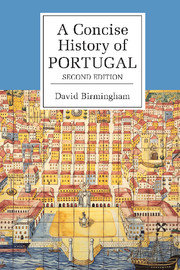Book contents
- Frontmatter
- Dedication
- Contents
- List of illustrations
- Introduction
- 1 Peoples, cultures and colonies
- 2 Rebellion and independence in the seventeenth century
- 3 The golden age and the earthquake in the eighteenth century
- 4 Brazilian independence and the Portuguese Revolution
- 5 The bourgeois monarchy and the republicans
- 6 The dictatorship and the African empire
- 7 Democracy and the European Community
- The houses of Avis, Beja and Habsburg
- The houses of Braganza and Braganza-Saxe-coburg
- Republican presidents
- Select source materials
- Selected works published since 1990
- Further reading in English
- Index
Introduction
Published online by Cambridge University Press: 05 June 2014
- Frontmatter
- Dedication
- Contents
- List of illustrations
- Introduction
- 1 Peoples, cultures and colonies
- 2 Rebellion and independence in the seventeenth century
- 3 The golden age and the earthquake in the eighteenth century
- 4 Brazilian independence and the Portuguese Revolution
- 5 The bourgeois monarchy and the republicans
- 6 The dictatorship and the African empire
- 7 Democracy and the European Community
- The houses of Avis, Beja and Habsburg
- The houses of Braganza and Braganza-Saxe-coburg
- Republican presidents
- Select source materials
- Selected works published since 1990
- Further reading in English
- Index
Summary
Portugal is one of history's most successful survivors. It is but a small country whose population rose slowly from one million to nine million over eight hundred years. In that time it acquired a political and cultural autonomy within Europe. It also made its mark on every corner of the globe through colonisation, emigration and commerce. Unlike the more prosperous Catalonia it succeeded in escaping from Spanish captivity in the seventeenth century. Unlike the equally dynamic Scotland it was not politically absorbed by its English economic patron in the eighteenth century. Unlike the middle-ranking kingdoms of Naples or Bavaria it was not cannibalised in the unification of the great nineteenth-century land empires of Europe. Unlike Germany and Italy it did not lose its African colonies in either the First or the Second World War. And unlike other farming countries such as Ireland or Denmark it remained outside the European Economic Community until the 1980s.
But Portugal was more than a tenacious survivor in modern history. It was also a pioneer in many of the historical developments of the European world. Portuguese Christians of the middle ages, with a little help from English mercenaries, fought bloodily against Portuguese Muslims to dominate the western rim of Europe by the thirteenth century. The Portuguese created Europe's first ‘modern’ nation state whose frontiers have not changed since the fall of the old Muslim ‘Kingdom of the West’ in the Algarve. A century later they pioneered the concept of overseas colonisation on the islands of the Atlantic.
- Type
- Chapter
- Information
- A Concise History of Portugal , pp. 1 - 10Publisher: Cambridge University PressPrint publication year: 2003

